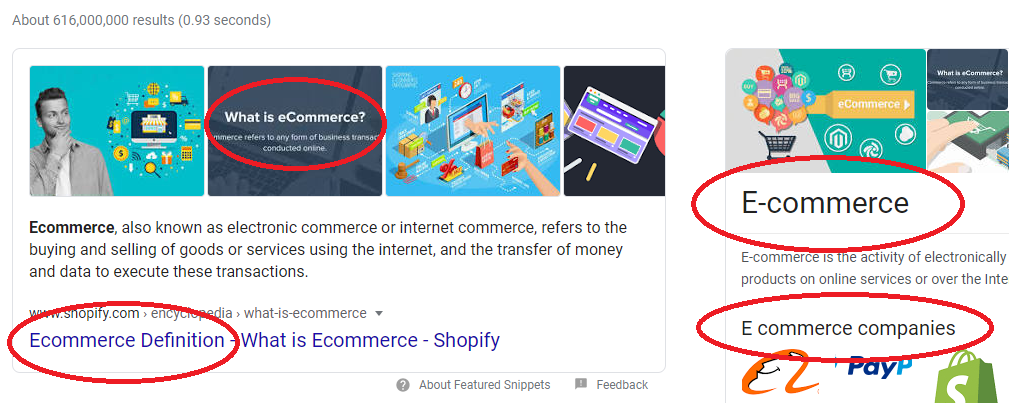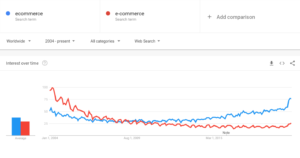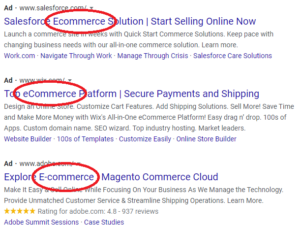When it comes to electronic commerce, the internet can’t seem to decide on what it wants.
A quick Google search offers their correct spelling as “E-commerce,” with a capital ‘e’ and hyphen. However, you don’t even have to scroll down the page before you’re faced with a plethora of different versions, all holding the same amount of authority.

From Shopify’s website referring to it as both “Ecommerce” and “eCommerce”, to countless reputable sources separating “E commerce” with a space, you’ve got to wonder why an industry so focused on keywords and organization can’t seem to nail down a definite spelling of its own name.
So, why is it different across so many platforms and professions? And how the heck are we supposed to write it?
A Short History Lesson
In case you need a refresher, electronic commerce refers to the millions of online transactions offered by retailers around the world. It’s primarily utilized on websites, mobile apps, and online marketplaces. The Amazon package on your doorstep? Yep, that’s E-commerce.
The first use of the term was coined after Michael Aldrich invented online shopping in 1971. Back then, it was simply called— you guessed it— “electronic commerce”. It wasn’t until a few years later that “E-commerce” became the first modernized way to shorten the name.
Aldrich went on to create the first stepping stones of email, e-business, and the awesomely-named ‘Teleputer,’ which was used hand-in-hand with online shopping systems at the time.
Here’s Where It Gets Tricky
With the invention of the Internet browser in 1993, the world wide web provided ample opportunity for the future of B2B and B2C marketing. And, much like the Internet itself, “E-commerce” began to evolve as more time and people got involved.
According to Google Trends, we can see a change in the global search preference from 2004 to present day 2020. The chart shows us shying away from the hyphen altogether, as the use of “E-commerce” continues to decrease, and the non-hyphenated “Ecommerce” gains popularity over the formerly predominant keyword around 2009.

But why?
As the industry itself became more prominent, so did our everyday use of the term. It’s now much more common to nix the hyphen and simply use “Ecommerce,” because it is no longer a relatively new concept. “E-mail” was met with the same fate; though it originated with a hyphen, our repeated use of the word has transformed it into a more casual spelling.
Not to mention, it doesn’t take an analytical expert to realize typing out a single, lowercase word is the quickest and easiest way to get your search results.
We can also assume the rise in “eCommerce” was due to the turn of the century’s enamourment with new technology. Just look at our millennium’s key sources of inspiration, such as 1996’s eBay launch and the 1998 iMac, and it’s no wonder lowercase letters at the beginning of words have lended itself to a very techno-savvy feel.

To Hyphen, Or Not To Hyphen?
Though the correct and technical spelling is “E-Commerce,” data strongly suggests a trend of industry experts gradually leaning towards “Ecommerce” or “eCommerce” without the hyphen.
The Square 205 marketing team has a few differing opinions on the matter.
Kyle is our Digital Marketing Strategist and team lead on PPC advertising and all things eCommerce. He prefers the “eCommerce” spelling due to his experience and lectures at UNT. Now here’s a guy that’s put his Digital Retailing Bachelor degree to good use!
Digital Marketing Strategist and Producer, Connor, strips the word of all capitalization and punctuation. His version of “ecommerce” stems from the grammatical argument that we don’t regularly capitalize the word “commerce”.
As for myself (Kate), I’ve shifted between many alternative spellings throughout the years. My Copywriting & Content Management background tends to gravitate towards both the capitalized “E-Commerce” and the more new age “eCommerce” spelling, except when used in a heading, title, or beginning of a sentence.
We’ve decided to stick with eCommerce.
Nevertheless, it can be maintained that each variation of the word is valid when used in the appropriate context.
ECommerce is an invaluable asset for both businesses and consumers alike. Whether you’re aboard the hyphen train or just enjoy the aesthetics of the lowercase ‘e’, the fact of that matter is that online shopping is here to stay.
Need some help with your eCommerce website? We’ve got you covered. Give us a call or contact us on Facebook to get started!
Curious about which eCommerce platform to use? Check out this post from our friends at DesignRush.

